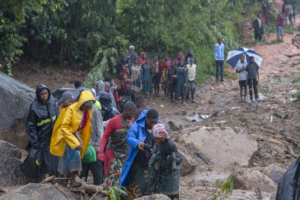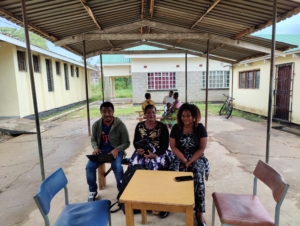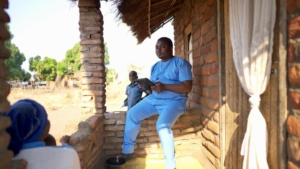Malawi was already grappling with a cholera outbreak when Cyclone Freddy struck in February and March 2023. Driven in part by the effects of climate change, Freddy now stands as both the longest-lasting and most energy-producing tropical cyclone ever recorded. Malawi endured the worst of the storm’s impact, experiencing catastrophic flooding and major damage to power infrastructure. As of March 30, at least 676 Malawians had lost their lives in the storm.(1) Adding to this devastating impact, the cyclone’s flooding has worsened the cholera outbreak by disrupting response activities and compounding water contamination. Already, the outbreak ranked as the deadliest in Malawi’s history: at least 36,943 cases and 1,210 deaths have been recorded.(2)

People walk up a hill in Blantyre on March 14, 2023, following cyclone Freddy’s landfall. (Photo by Amos GUMULIRA / AFP)
“We were working with the Ministry of Health to deliver water purification supplies in Salima, Nsanje, and Chikwawa Districts in response to the cholera outbreak,” says Dalitso Baloyi, Last Mile Health’s Malawi Country Director. “The cyclone interrupted this.”
For rural and remote communities, the impact of the cyclone is especially acute. Even for routine care needs, such as prenatal check-ups and child immunizations, flooding has made travel to clinics nearly impossible.
So what is the key to helping ensure patients receive care during crises like these? An adequately skilled, supervised, salaried, and supplied community health workforce. Community health workers conduct active disease surveillance and can raise the alarm at the beginning of an outbreak. As trusted members of their communities, they can educate their neighbors on preventative measures and keep routine health services going. And when natural disasters limit travel, they are often the only health workers within reach.
Members of the Last Mile Health Malawi team spoke to four community health workers—known nationally as health surveillance assistants (HSAs)—in Salima District in the immediate aftermath of Cyclone Freddy. From those on the front lines, here’s what they need in order to provide care for their patients at this critical time. (Answers have been edited for clarity.)
Haroon Twalibu, Digital Health Specialist, Last Mile Health: How have the cholera outbreak and Cyclone Freddy impacted your work and your community?
Rhoda Ndojime: Damaged latrines due to the strong rains has affected our cholera fight.
Patrick Chamatwa: The cholera outbreak really stretched us thin. As we were busy with cholera vaccination, it slowed down most of our regular work.
Precious Mtalimanja: They have disrupted our usual programming.
Rester Chitsonga: This has taken a dent on other services we provide in the community, such as the provision of health education services like malaria.
Haroon Twalibu: What is the biggest challenge you are currently facing in your work?
Rhoda: Lack of essential training—for example, on topics such as integrated community case management of childhood illnesses at the village clinic, and family planning—so that most services can be delivered within the community.
Precious: Mobility.

Haroon Twalibu (left) speaks with health surveillance assistant Rhoda Ndojime (center) and assistnant environmental health officer Chimwemwe Banda (right) at Admarc Health Facility in Salima District, Malawi.
Patrick: Lack of essential training and medical supplies to support people in my community, as they have to travel long distances to access such key services.
Rester: The cholera outbreak and a recent COVID surge has affected our work.
Haroon Twalibu: What support do you need in order to do your job well and provide the best care for your patients?
Rester: Mobility is key. Push bikes are not the best mode of transport—motorbikes would be nice even on a loan or credit basis.
Rhoda: To be adequately equipped with essential drugs and PPEs.
Patrick: A motorbike would be nice, as I travel 14 kilometers to get to my community.
Precious: Mobility is a big issue. For digital health initiatives, access to the internet is key!
Haroon Twalibu: Why is it important to invest in community health workers?
Rhoda: Investing in health workers would help us efficiently carry out our work.
Patrick: It would empower us and motivate us to work harder.

Health surveillance assistant Precious Mtalimanja speaks with a patient during a home visit in Salima District, Malawi.
Rester: We are the direct link between the health system and the community. The community generally trusts community health workers, and this familiarity comes in handy during sensitization campaigns.
Precious: Community health workers are key in providing primary health care. Adequately funding us would lessen the burden for districts and major hospitals in dealing with diseases.
Haroon Twalibu: As a community health worker, what’s one message you would like to share with donors and leaders?
Patrick: Continue funding upskilling projects.
Rhoda: Continue supporting and funding supervision and mentorship exercises.
Precious: Find ways of streamlining our work, like digital health initiatives.
Rester: Upskilling initiatives across different diseases and programs are key, as well as refresher training.
References:
(1): https://www.africanews.com/2023/03/30/malawi-cyclone-freddys-death-toll-rises-to-1200/
(2): World Health Organization (9 February 2023). Disease Outbreak News; Cholera – Malawi. Available at https://www.who.int/emergencies/disease-outbreak-news/item/2022-DON435




